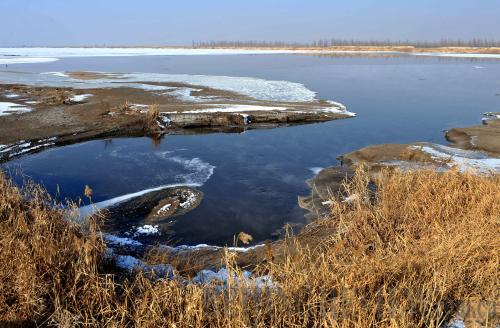|
 |
|
SEWAGE LAKE: Wastewater discharged by several companies in an industrial park in Rogtoh County, Inner Mongolia Autonomous Region, forms a dirty artificial lake, posing health hazards to nearby residents (REN JUNCHUAN) |
Situated between undulating hills and Poyang Lake, the largest freshwater lake in China, Leping City in central China's Jiangxi Province was famous for its natural beauty and the production of high-quality vegetables.
But after an industrial park opened there in 2004, farmers found their vegetable and rice yields plunge.
Leping Industry Park is home to more than 50 companies including more than 30 chemical plants, which primarily produce pharmaceutical chemicals, plastic decorations and construction materials.
Cheng Niuzai, a 63-year-old resident of Xinwan Village, which sits adjacent to the industrial park, said that the pollution was so bad that trees, flowers, fruits and vegetables could barely survive in the vicinity. Cheng said that he could only grow root vegetables such as carrots and sweet potatoes.
Sewage from the industrial park is discharged to nearby Le'an River through two open channels. One of these channels passes by Xinwan. Villagers say that as a result of the factories' industrial effluent, the water in their wells is no longer drinkable.
Another channel passes through a wastewater treatment plant in the industrial park and then flows into the Le'an River. However, the plant is not in operation.
"The plant, originally designed to treat domestic wastewater, is incapable of treating industrial wastewater," said Zhu Xiaoping, Deputy Director of Leping City Environmental Protection Bureau.
According to Zhu, the plant is being upgraded and is expected to meet industrial wastewater treatment standards in June 2012. Zhu said that in the interim, heavily polluting companies in the park had been ordered to halt or restrict production.
Some of the highly polluting companies in the park were relocated to Leping from more economically advanced neighboring coastal provinces such as Zhejiang.
"Economically developed coastal areas have adopted a policy called 'emptying the cages and changing the birds' to transform their economic structure, and as a result, some highly polluting, energy- and labor-intensive factories and industries have been closed down to make room for cleaner industries," said Tan Huiru, a researcher with the Jiangxi Provincial Academy of Social Sciences.
As a result, dirty industries have migrated to less developed inland areas, where local governments, hungry for higher GDP, have neglected environmental protection.
For example, Ji'an in Jiangxi once had more than 50 paper mills, most of which moved to the city after they lost their licenses in coastal provinces.
Citing an anonymous source, the China Youth Daily said that polluting companies in the pharmaceutical industry were migrating to central and west China to dodge the high costs they would have to pay for cleaner production in more regulated cities.
Treating waste generated during the production process is usually costly. For example, Zhongrun (Inner Mongolia) Co. based in Rogtoh County in north China's Inner Mongolia Autonomous Region, a subsidiary of the Shijiazhuang Pharmaceutical Group headquartered in Shijiazhuang, capital of Hebei Province, reportedly would have to invest 2 million-3 million yuan ($310,000-$460,000) on equipment upgrades to meet national environmental standards, and the operation cost of such equipment would slash the company's annual profits by a third.
| 